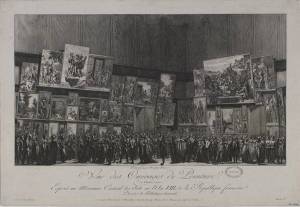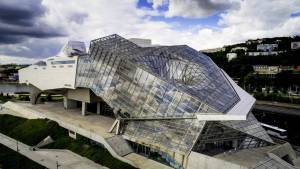A little history
The word «museum» dates back to classical antiquity: from the Greek museion, temple of the Muses. The modern definition of the word is “public display collection”.
13th - 17th centuries - La magnificence of the princes
Patronage and interest in the arts are present among the princes of the late Middle Ages, from Charles V to Jean de Berry, not to mention the dukes of Burgundy. Magnificence becomes a characteristic of the Renaissance prince. Magnificence means “the prince’s ability to demonstrate his right to govern through his wealth and the actions and magnanimous gestures that flow from it.” The arts are an ideal way to show magnificence.
The taste of the collection developed among the kings of France, inspired by the example of the Italian princes. The collections gathered by the sovereigns testify to the taste of their time, but also to the influence of the conflicts that then agitated Europe and which sometimes led to the discovery of the art of a rival country. Francis I’s military campaigns in Italy are an example. François I does not gather only a cabinet of paintings, including the famous Mona Lisa. He surrounds himself with famous artists, such as Leonardo da Vinci or Jean Clouet. He commissioned his portrait from the greatest artists (Titian) and invited decorators from Italy and Flanders to decorate the Fontainebleau palace. This example is followed by the main characters of the kingdom, such as Constable Anne de Montmorency, in his castle of Ecouen (present National Museum of the Renaissance). Henri IV ordered the construction of the great gallery of the Louvre Palace, in order to display the works of the royal collections and to house artists working for the royal power.
Inspired by his predecessors, and supported in this policy by Minister Colbert, Louis XIV used the arts to testify to his greatness. He enriched the royal collections, placed the finest artists at the service of the Crown, commissioned lavish furniture, and decorated the royal palaces (Louvre, Versailles) with decorations to the glory of the absolute monarchy.
18th - 19th centuries – Du cmuseum of curiosity
Passionate about science and knowledge, the Age of Enlightenment sees the apogee of the cabinets of curiosities, where rare, precious or scientific objects rub shoulders. At the same time, wealthy art enthusiasts gather important art collections.
As early as 1747, the critic La Font de Saint-Yenne in his Reflections on some causes of the present state of painting in France, the opening of the Galerie du Palais du Luxembourg in Paris in order to make known the major works of the royal collections; it was obtained in 1750.
Beyond the French borders, several major museums opened their doors to the public: the British Museum in 1759, Mannheim in 1756, Dresden in 1760, Cassel in 1769, Düsseldorf in 1770. In Florence, the Uffizi hosted the Medici collection in 1767, while the pontifical collections were installed at the Museo Pio-Clementino in 1784.
During the Revolution of 1789, the royal collections, clergy property, and collections of the Emigres were seized. The nascent Republic makes a scrupulous inventory of «paintings, drawings and statues», «models of machines» and series of natural history which have the vocation to join the «Central Museum of Arts» created in 1793 at the Louvre, but also the science and technology museum and the natural history museum.
In 1801, fifteen large cities in France, but also Brussels, Mainz and Geneva, then located in recently annexed territories, received the first large state depots. Thus began a policy which, throughout the 19th and 20th centuries, would complete the collections of museums.
Then, and until the First World War, the encyclopaedic ambition that led to the creation of the «Central Museum of Arts» was maintained. Museums appear, more and more numerous, and their collections are enriched, at the initiative of artists (museums Rodin, Henner, Moreau…), scholars (Emile Guimet), travelers, parliamentarians, learned societies...
20th century to today: Development and protection of public collections
The spectacular development of museums in the second half of the 20th century reinforces this landscape without uniformity.
An ordinance of 17 April 1945 defines the «provisional organisation» of the «Fine Arts Museums». Natural history museums are governed by Decree 48-734 of 27 April 1948 on the organization of the National Service for Museology of the Natural Sciences. However, the organization and operating methods of museums are not the subject of systematic texts. The law of 4 January 2002 fills this gap by establishing the specific status of «museums of France», attributed to institutions meeting specific scientific and cultural criteria. This designation, a guarantee of quality, is now clearly identifiable by the public.
Major projects are carried out at the highest levels of the State (Centre Georges Pompidou, Musée d'Orsay, Grand Louvre, musée du quai Branly Jacques Chirac). The communities are not left out, and construction sites are multiplying throughout the territory.
Partager la page




